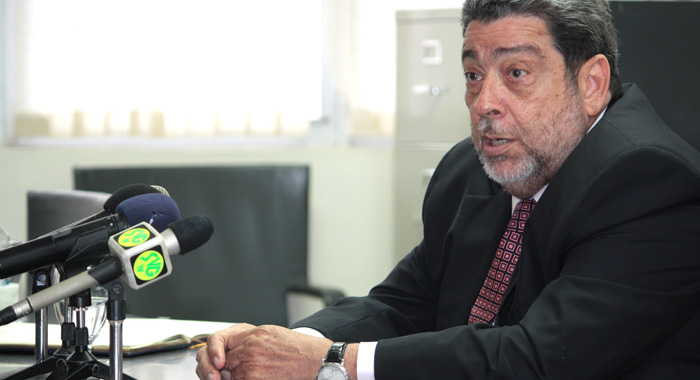
The political impasse in St. Kitts and Nevis will only be resolved through general elections, Prime Minister Dr. Ralph Gonsalves said Tuesday, adding that there is currently no basis for external intervention.
Gonsalves’ comments on radio came as he commented on a letter written to him by Opposition Leader Arnhim Eustace, asking that he and his CARICOM colleagues intervene as the stalemate continues.
Opposition lawmakers in the twin island federation — which is both a member of CARICOM and closer integrated sub-regional bloc, the Organisation of Eastern Caribbean States (OECS) — have failed since December to have the national assembly debate a motion of no confidence in the Dr. Denzil Douglas government.
The opposition MPs in Basseterre have gone to court and have also taken their case to CARICOM, the OECS and the Commonwealth Secretariat, and Eustace also copied his letter to Gonsalves to these organisations.
Gonsalves, however, said that when the Commonwealth Secretary General visited Basseterre about two months ago, he concluded that the internal mechanisms for resolving legal or political conflict are still in place.
“Those have not been exhausted and there has not been a breakdown of law and order, neither is such a breakdown apprehended. So, on what basis can we then intervene?” Gonsalves said.
Six of the 11 lawmakers in Basseterre who qualify to vote on a motion of no confidence, have signalled their intention to cast their ballot against the government, which could mean a fall of the Douglas administration and fresh elections.
But Gonsalves said that while the opposition
is claiming that they have the moral high ground, two of their members were led two years ago into a fourth term by Douglas.
The two, former deputy prime minister, Sam Condor, and former minister of foreign affairs, Dr. Timothy Harris, have since crossed the floor and now sit on the opposition benches.
“They ran on a party ticket. Shouldn’t you then do the morally right thing and resign your seat because you were elected on a party ticket headed by the very prime minister?” Gonsalves said.
He said if the two MPs resign their sit and retake them in by-elections, they can then argue that the people support them rather than Prime Minister Douglas.
Gonsalves further noted that opposition chose to go to court rather than deal the matter politically.
When the opposition tried to withdraw the case, the speaker of the national assembly objected, saying that there are important democratic principles on which the court needs to pronounce.
Gonsalves, who is also a lawyer, said, he believes the opposition ought not to have gone to court, otherwise the government would not have been able to justify the delays in debating the motion.
“So, what is happening, everybody is seeking to use the law courts for their own political advantage, or seeming political advantage, and the opposition got trapped in the process from which it is still trying to extricate itself.
“So I ask the question, ‘How can I then intervene formally in a process when the internal mechanisms for resolving these problems are yet to be exhausted and where we do not have a disruption of normal life?’”
He said that unlike the political unrest in St. Vincent and the Grenadines in 2000, where people took to the streets in mass protest, normal like in St. Kitts and Nevis has not been disrupted.
“The internal mechanisms were unable to solve the problem and the only solution was general elections,” he said of the Vincentian scenario.
“Now, I expect that in St. Kitts and Nevis that is how the resolution is going to come, through general elections.”
Gonsalves, however, said that constitutional texts say that a vote of no confidence should be debated “within the shortest practicable time”.
“But practicable would take into consideration extenuating circumstances, exceptional circumstances of state; but obviously, the government can’t continue indefinitely with the majority of the elected representative not in its favour,” he said.
Gonsalves said that while he would write a response to Eustace’s letter, the Leader of the Opposition’s communiqué does not appreciate “the whole mix of issues”.
“Democratic government must show its representative character and when a government loses its representative character, that government must either have itself subjected to a vote of no confidence or it gone to the polls,” Gonsalves said.
“But those bedrock principles have been complicated by other bedrock principles of a functioning democracy, that is to say, the rule of law,” said Gonsalves, who is second to Douglas as the region’s longest sitting prime minister.





